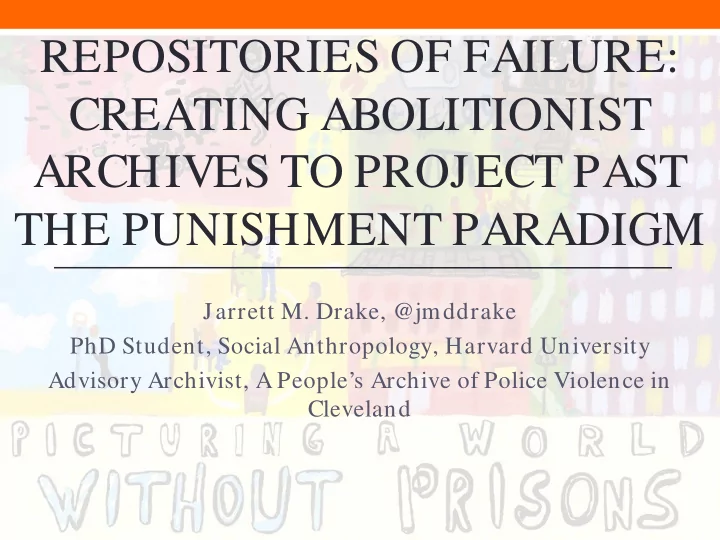

REPOSITORIES OF FAILURE: CREATING ABOLITIONIST ARCHIVES TO PROJECT PAST THE PUNISHMENT PARADIGM Jarrett M. Drake, @jmddrake PhD Student, Social Anthropology, Harvard University Advisory Archivist, A People’s Archive of Police Violence in Cleveland
Archivists Obsess Over Obsolescence
Angela Y. Davis’s View on Obsolescence “Many people have already reached the conclusion that the death penalty is an outmoded form of punishment that violates basic principles of human rights. It is tim e, I believe, to encourage sim ilar conversations about the prison … The question of whether the prison has become an obsolete institution has become especially urgent in light of the fact that more than two million people (out of a world total of nine million) now inhabit U.S. prisons, jails, youth facilities, and immigrant detention centers.”
Angela Y. Davis’s View on Obsolescence Prison am endm ent Prison abolition
Point and Path Point “… .abolitionist archives constitute a critical component to the constellation of alternatives to imagine a societal landscape free from our present punishment paradigm” Path Origin of the punishment paradigm 1. The persistence of the paradigm in police 2. The creation of abolitionist archives to envision a 3. society free of prisons and police
Part 1: Origins of the Punishment Paradigm
Defining the Paradigm “The punishment paradigm might be characterized as a perspective and an administration of justice that responds to social discords, disruptions, and disturbances by authorizing armed agents of the state to enact arbitrary amounts of violence—including but not limited to incarceration, surveillance, and forced labor—upon those peoples in a society deemed to be its deserving delinquents… The irrational and inconsistent logic of the paradigm posits that control and capitalization of incorrigible bodies supersede any concerns for actual safety and security, as safety and security are pro forma considerations for a paradigm empowered for the prima facie purpose to encum ber and enslave (in)discriminately.”
Foundation of the Paradigm “Colonial America had more jails than public schools or hospitals… ” – Scott Christianson “The rising number of impoverished immigrants from Europe, especially Ireland, as well as of black migrants… contributed to an increasing sense that a rapidly growing class of masterless men and women threatened property, proper social order, and good republican government… ” – Newman and Smith “… punishment… was palatable to liberal society because it was applied disproportionately to marginal Americans—male youths, poor people, recent immigrants, and black males as well as fallen women—who lacked the wherewithal to challenge patriarchal political power.” – Mark E. Kann
Science in Secret Time-based incarceration > public acts of punishment
Troubling Trend in the 19 th Century Anti- slavery movement Pro-prison movement
Auburn System: Prison Order & Prison Profit
Fruits of a Poisonous Root “The apparent contradiction between advocating freedom for slaves but advocating incarceration for convicts is reconciled with the reality that enslavem ent itself was a form of incarceration and likewise incarceration was a form of enslavement… incarceration is not a descendant of slavery but in fact a surviving sibling .”
“Repositories of Failure” Michel Foucault, Discipline and Punish: The Birth of the Prison , p. 280
Part 2: Persistence of the Punishment Paradigm in Police
The Point of Policing “It was part of my business to arrest all slaves and free persons of color, who were collected in crowds at night, and lock them up… I am paid fifty cents for every negro I arrest, and fifty cents more if I flog him. I have flogged hundreds. I am often employed by private persons to pursue fugitive slaves. I have been employed since 1833. I never refuse a good job of that kind.” – a constable in Virginia, 1851
Explanation of the Endurance Punishment Police violence Absence of accountability
“National Guardsmen patrol the area around Linwood and Chicago on Detroit's West Side during the civil unrest of 1967.”
Art Blakey, People’s Tribunal on Police Brutality. http:/ / www.archivingpoliceviolence.org/ items/ show/ 81.
Alicia Kirkman, People’s Tribunal on Police Brutality. http:/ / www.archivingpoliceviolence.org/ items/ show/ 77.
Absence of Accountability “… we found incidents of CDP officers firing their guns at people who do not pose an immediate threat of death or serious bodily injury to officers or others and using guns in a careless and dangerous manner… At times, this force appears to have been applied as punishment for the person’s earlier verbal or physical resistance to an officer’s command, and is not based on a current threat posed by the person… Principal among the systemic deficiencies that have resulted in the pattern or practice we found is the Division’s failure to im plem ent effective and rigorous accountability system s .” – U.S. Department of Justice, Investigation of the Cleveland Division of Police, 2014
Part 3: Abolitionist Archives
Definition of Abolition “Abolition defines both the end goal we seek and the way we do our work today. Abolition means a world where we do not use prisons, policing, and the larger system of the prison industrial complex as an ‘answer’ to what are social, political, and economic problems. Abolition is not just an end goal but a strategy today.
Function: Limitation STOP Limit Living TAVP Bridges
Function: Resistance TGIJP Resist Women Amplify and Voices Prison
Definition of Abolitionist Archive “…as memory, information, and documentary projects, networks, or efforts that strive towards the construction of a society in which all bodies and minds enjoy an equal opportunity to be free of coercion, cages, and control by state and individual actors alike.”
Points of Divergence Independent of existing memory institutions and state 1. power Societal change is more significant than the 2. accumulation and preservation of “stuff” More conducive to ethnographical than biographical 3. research usage
Reparation as Radical Truth-Telling Ida B. Wells-Barnett, wearing “Martyred Negro Soldiers” button, ca. 1917-1919,
The Obsolescence of Archives
Recommend
More recommend